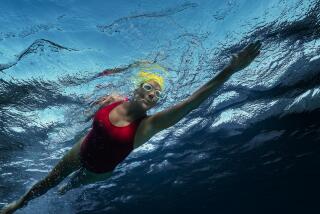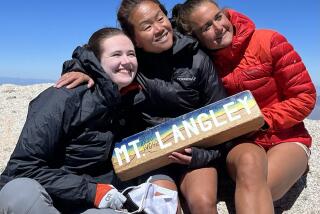Inner Vision Guides This Blind Swimmer : Mission Viejo’s Trischa Zorn Proves She Deserved Her College Scholarship
- Share via
There’s something very special about the 10 gold medals that Mission Viejo swimmer Trischa Zorn holds in her hand. Not only do they represent the 10 world records she set two weeks ago in Goteberg, Sweden, but they’re inscribed in a language common to no one country: Braile.
Zorn, 22, legally blind since birth, competed in the World Championships for the Disabled, a two-week sports festival that allows athletes to compete in various categories.
Zorn competed in eight individual events and two relays, all of which she set records in--all records she had held.
When competing in these events, Zorn is classified in the B-2 category for those with 20/800 vision. Zorn has aniridia blindness, which means she is without irises, the portions of the eyes that regulate the amount of light absorbed. Though she can see the rough outlines of an object up to 20 feet away, she cannot see its features.
“People ask me how I do it,” said Zorn, a Mission Viejo High School graduate. “They ask if I hit the walls or the lane lines. But it’s not really that hard. When I first started swimming, I bumped into the wall a few times, but I usually can see the black line on the bottom of the pool, or on backstroke I look for the flags and count my strokes.”
Zorn started swimming at 8, after she heard about a team that was being formed in her hometown of Tustin. Though she had been involved in dancing and gymnastics, Zorn chose swimming when her mother urged her to concentrate on one sport.
“I really enjoy competing,” Zorn said. “And swimming seemed to offer that more than anything else I knew of. My mom told me if I wanted to be really good at something I’d have to concentrate on just it. So that’s what I did.”
When Zorn was 10, her family moved to Mission Viejo, the Mecca for promising young swimmers at the time. While in high school, Zorn placed second as a senior in the 100-yard backstroke of the Southern Section 4-A finals, prompting several scholarship offers from such schools as Ohio State, Washington State and Nebraska.
Hers was the first full athletic scholarship given to a visually impaired person.
She chose Nebraska not only for its impressive athletic facilities, but for its respected special-education program, in which Zorn had chosen to study.
“Also,” the college senior said, “I’ve always wanted to live in snow.”
Though that might surprise others, Zorn doesn’t believe her disability limits her to an indoor life style. She often competes in 10-kilometer runs and half-marathons with the aid of a friend. She enjoys horseback riding and water-skiing. And someday she’d like to try snow skiing.
Why all the extra activity when swimming calls for four hours of training each day?
“I like to stay active all the time,” she said. “I love the outdoors and doing things that are a challenge. My coach (Ray Huppert) says my best and my worse quality is my stubbornness. I’ll do something until I get it right, you know?”
Though she admits her disability limits her from some personal comforts, such as driving a car, Zorn feels she’s learned a lot about herself from athletics.
“I’ve learned what my limits are; what I can and can’t do,” she said. “But as an athlete, I think I can do what everyone else can do because I want to do it . . . or do it better. Some people are so amazed that I can swim and stuff, but just because you’re handicapped doesn’t mean you can’t compete or do what the able body can do.”
More to Read
Get our high school sports newsletter
Prep Rally is devoted to the SoCal high school sports experience, bringing you scores, stories and a behind-the-scenes look at what makes prep sports so popular.
You may occasionally receive promotional content from the Los Angeles Times.






